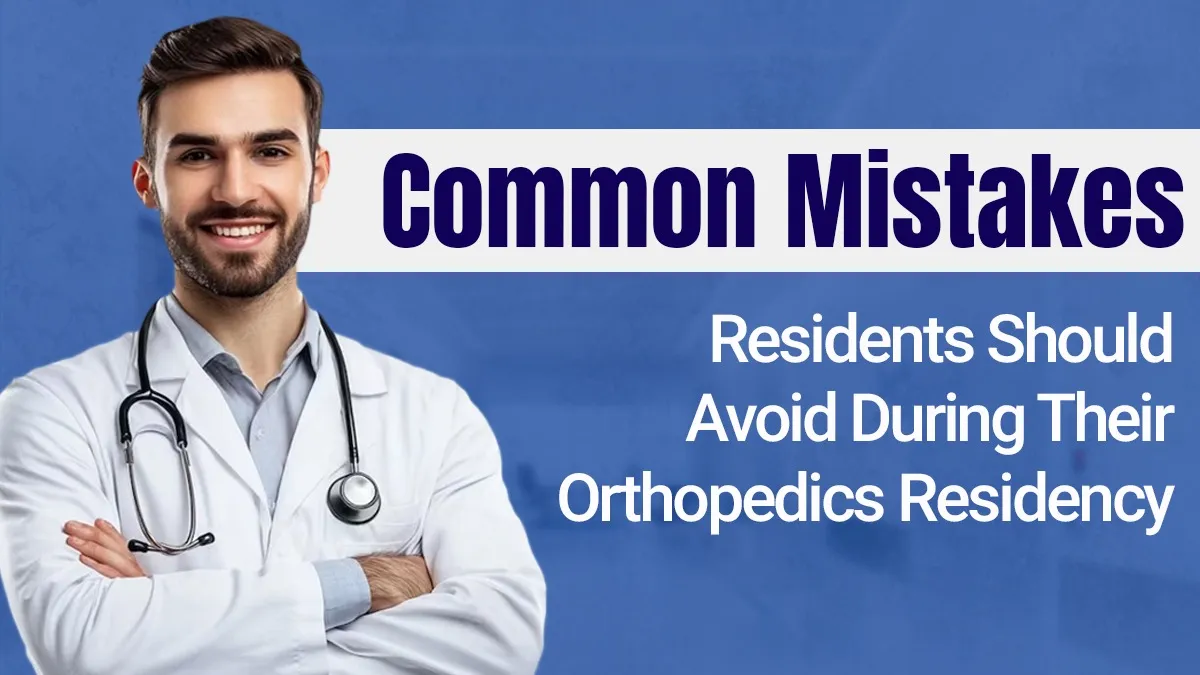
Common Mistakes: Residents Should Avoid During Their Orthopedics Residency
Estimated reading time: 4 minutes
Orthopedic residency is a three year, chaotic, and intense path that perfectly balances learning theory, surgical skills, and patient management. Many mistakes will be made along the way, even though most might be common, by acknowledging common mistakes, it is possible to smoothen your orthopedics residency path.
In the following, we mention a few mistakes to avoid during your orthopedic residency program:
1. Ignoring the Fundamentals
It is imperative to have a solid background in basic orthopedic principles before getting into complicated cases and operations. Many orthopedics residents are so procedure-oriented that they neglect basic anatomy, biomechanics, and pathology, which are needed for proper diagnosis and treatment planning.
- Spend time reading standard orthopedic textbooks, listening to lectures, and participating in organized learning materials such as Conceptual Orthopedics, which provides a holistic method of establishing a strong foundation in orthopedics.
2. Inadequate Surgical Preparation
Going into the operating room without preparation is a frequent error among orthopedic residents. Failure to read through the surgical steps, anatomy involved, and possible complications may cause confusion during the procedure and impact your learning process.
- Prioritize preoperative planning. Read about the surgical technique in advance, consult with your seniors, and observe good-quality surgical videos to get a view of the steps involved.
Must Read: Why Junior Residents Should Join Conceptual Orthopedics?
3. Disregarding Clinical Documentation
Orthopedic residents tend to overlook the significance of proper clinical documentation. Poor or inaccurate patient records have the potential to cause legal problems, inadequate communication between teams, and an inability to monitor patient progress.
- Build the habit of recording patient history, examination results, investigations, and treatment plans. Use electronic medical records (EMRs) effectively and keep all notes brief and to the point.
4. Neglecting Postoperative Care
Orthopedic residents tend to put a lot of emphasis on surgery but not on postoperative care, which is just as vital for patient recovery and success in surgery.
- Oversee your patients during the post-operative period closely. Proactively follow through on pain control, wound dressing, and physiotherapy management to enhance results.
5. Not Getting Assistance Early Enough
Certain residents avoid requesting help out of criticism, but this avoidance in tricky cases may lead to mistakes and threaten patient safety.
- Create an open communication culture with your senior residents and faculty. If you are in doubt about a diagnosis, surgical step, or patient management, ask for advice immediately.
6. Inefficient Time Management
Clinical responsibilities, academics, and personal health are a balancing act. Inefficient time management can result in burnout and poor learning.
- Prioritize, utilize scheduling tools, and set aside focused study time. Conceptual Orthopedics offers focused learning material that assists residents in maximizing their study time efficiently.
7. Underestimating Research and Academics
Concentrating on clinical work alone without attending to research may reduce future career prospects. Most residents do not read journals and join research activities due to their hectic schedule.
- Begin small by reading one research article per week, and then gradually engage in case reports, clinical studies, and academic debates. This will contribute to career development and fellowship.
8. Forgetting Self-Care and Mental Health
Residency is stressful, and most residents avoid sleep, exercise, and mental health in the process. This can result in burnout, reduced performance, and even long-term health problems.
Practice a healthy work-life balance. Sleep well, exercise regularly, and ask for help if overwhelmed.
Conclusion:
Avoiding these typical traps can make your orthopedic residency easier and more pleasurable. Conceptual Orthopedics provides a methodical and structured approach to understanding the theoretical and practical aspects of orthopedics, maximizing your learning.
Also Read:
9 Must Know Rules of Residency by Dr. Apurv Mehra

